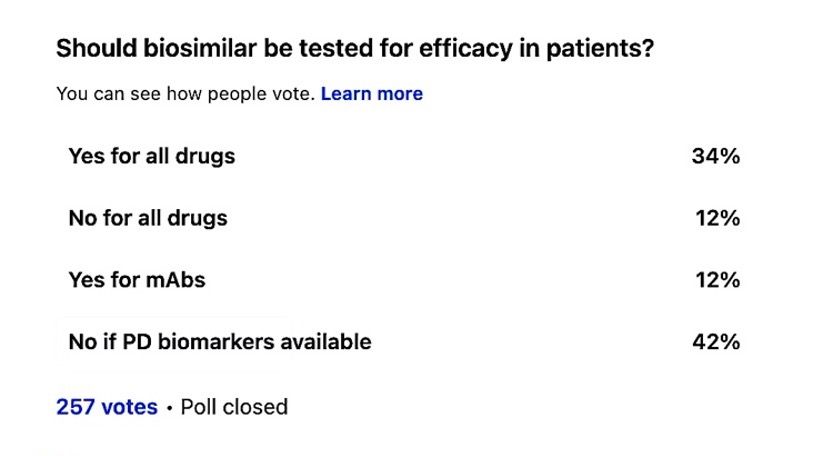- Bone Health
- Immunology
- Hematology
- Respiratory
- Dermatology
- Diabetes
- Gastroenterology
- Neurology
- Oncology
- Ophthalmology
- Rare Disease
- Rheumatology
BioRationality: Efficacy Testing and Interchangeability of Biosimilar Remains a Dogma for Most
Sarfaraz K. Niazi, PhD, comments on a poll he conducted revealing that many are still hesitant to remove clinical efficacy study requirements for biosimilars in his latest column.
While much has been written about the futility of comparative efficacy testing of biosimilars, the mindset of stakeholders that efficacy testing is a golden slate remains alive. I conducted a poll of my LinkedIn connections, with surprising results. Only 12% agreed that there is no need for efficacy testing; others considered pharmacodynamic (PD) biomarkers or differentiated the monoclonal antibodies (mAbs). This was not what I had expected. Although it is a smaller poll and may include biased participants, the divide is remarkable.
Niazi's Linkedin poll

The reasons for these results may come from the shared knowledge of statistics. In lay terms, the acceptable margin of difference must be smaller than the variability ever to fail a product; for all such testing, an arbitrary difference of 30% to 40% is accepted as “clinical judgment” while the real difference is almost close to zero. These trials can never fail, as thousands of such reports tell us. The reason for removing efficacy trials is not just to reduce the development cost by two-thirds, but to ensure no human abuse, according to the US 21CFR320.25(a)(13).
This issue becomes more significant when discussing interchangeability; why would 3 trials fail if 1 trial can never fail? The FDA has acknowledged that interchangeability does not ensure better biosimilar safety or efficacy. The only thing I can think of is the political concerns. Recently, Safe Biologics has begun a campaign to block the FDA from considering the removal of interchangeability. Their conference in collaboration with Generics and Biosimilars Initiative Journal conducted on November 30 was based on what I perceive to believe are misconceptions as those who presented their views had no qualification to question the FDA initiatives, in my opinion. This could be a political issue. We need to educate stakeholders that biosimilars are safe and should be affordable, if possible, without having an overwhelming focus on the development cost.
Escaping the Void: All Things Biosimilars With Craig & G
May 4th 2025To close out the Festival of Biologics, Craig Burton and Giuseppe Randazzo from the Association for Accessible Medicines and the Biosimilars Council tackle the current biosimilar landscape and how the industry can emerge from the "biosimilar void."
Will the FTC Be More PBM-Friendly Under a Second Trump Administration?
February 23rd 2025On this episode of Not So Different, we explore the Federal Trade Commission’s (FTC) second interim report on pharmacy benefit managers (PBMs) with Joe Wisniewski from Turquoise Health, discussing key issues like preferential reimbursement, drug pricing transparency, biosimilars, shifting regulations, and how a second Trump administration could reshape PBM practices.
Eye on Pharma: Interchangeability Labels and Expanded Biosimilar Partnerships
May 29th 2025The FDA designates 2 biosimilars as interchangeable, enhancing access to treatments for inflammatory diseases and multiple sclerosis, while 2 other companies expand their biosimilar partnership to include more products.
